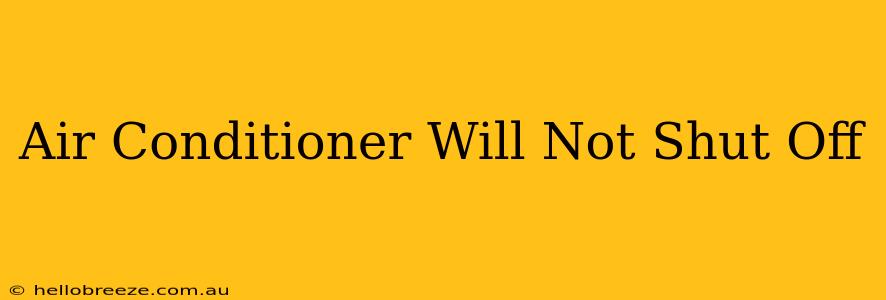Is your air conditioner running non-stop, refusing to turn off even when the thermostat is set correctly? This frustrating problem can quickly lead to increased energy bills and potential damage to your unit. Don't panic! This guide will walk you through common causes and solutions for an air conditioner that won't shut off.
Understanding Your AC System: Why It Might Not Turn Off
Before diving into troubleshooting, it's helpful to understand the basic components of your AC system and how they work together. A properly functioning system cycles on and off based on the temperature set on your thermostat. When the room temperature reaches the desired setting, the compressor and fan should shut down. If this isn't happening, there's a problem somewhere in the system.
Common Reasons Your AC Won't Turn Off:
- Thermostat Issues: This is often the culprit. A malfunctioning thermostat might not accurately read the room temperature, causing the AC to run continuously. Check the batteries (if applicable), the wiring connections, and ensure it's properly calibrated.
- Dirty Air Filter: A clogged air filter restricts airflow, preventing the unit from cooling efficiently. The AC will run longer to compensate, potentially never turning off. Regular filter cleaning or replacement is crucial.
- Frozen Evaporator Coil: Restricted airflow (due to a dirty filter, clogged vents, or a frozen coil) can cause ice to build up on the evaporator coil. This ice buildup can block airflow further, leading to continuous operation.
- Refrigerant Leaks: Low refrigerant levels prevent the AC from cooling properly. The unit will struggle to reach the set temperature and run constantly in an attempt to compensate. This requires professional attention.
- Faulty Compressor: The compressor is the heart of the AC unit. A malfunctioning compressor can prevent the unit from cycling off correctly. This usually requires professional repair or replacement.
- Electrical Problems: Loose wiring, faulty capacitors, or other electrical issues can prevent the AC from turning off properly. This is a serious issue and should be addressed by a qualified technician.
- Incorrect Thermostat Settings: Double-check your thermostat settings. Ensure the "Cool" mode is selected and that the temperature is set appropriately. Check for any unusual settings or options that may be interfering with proper operation.
Troubleshooting Steps: What to Do
Let's systematically tackle these potential problems:
1. Check the Thermostat:
- Batteries: Replace the batteries if it's battery-powered.
- Wiring: Inspect the wiring connections for any loose or damaged wires.
- Calibration: Refer to your thermostat's manual for instructions on calibration.
- Mode Selection: Make sure the mode is set to "Cool" and not "Fan Only" or "Heat".
2. Inspect and Clean the Air Filter:
- Locate the filter: The air filter is usually easily accessible behind a panel on the air handler.
- Clean or replace: Clean the filter with a vacuum or replace it with a new one. Replace filters regularly, typically every 1-3 months.
3. Check for Frozen Evaporator Coil:
- Turn off the AC: Allow the unit to defrost naturally.
- Inspect for ice: Once defrosted, check for any other obstructions that might cause a freeze-up.
4. Look for Obstructions:
- Vents: Ensure that all vents are open and unobstructed.
- Exterior Unit: Make sure nothing is blocking the airflow around the outdoor unit.
When to Call a Professional:
If you've tried these troubleshooting steps and your air conditioner still won't shut off, it's time to call a qualified HVAC technician. Issues such as refrigerant leaks, compressor problems, or electrical faults require professional expertise and should not be attempted as DIY repairs. Ignoring these problems can lead to further damage and potentially expensive repairs down the line.
Remember: Safety is paramount. Always disconnect the power to your AC unit before attempting any internal inspections or repairs. Improper handling of electrical components can lead to serious injury or damage. By following these steps and seeking professional help when needed, you can get your air conditioner back to its efficient, properly-cycling self.

